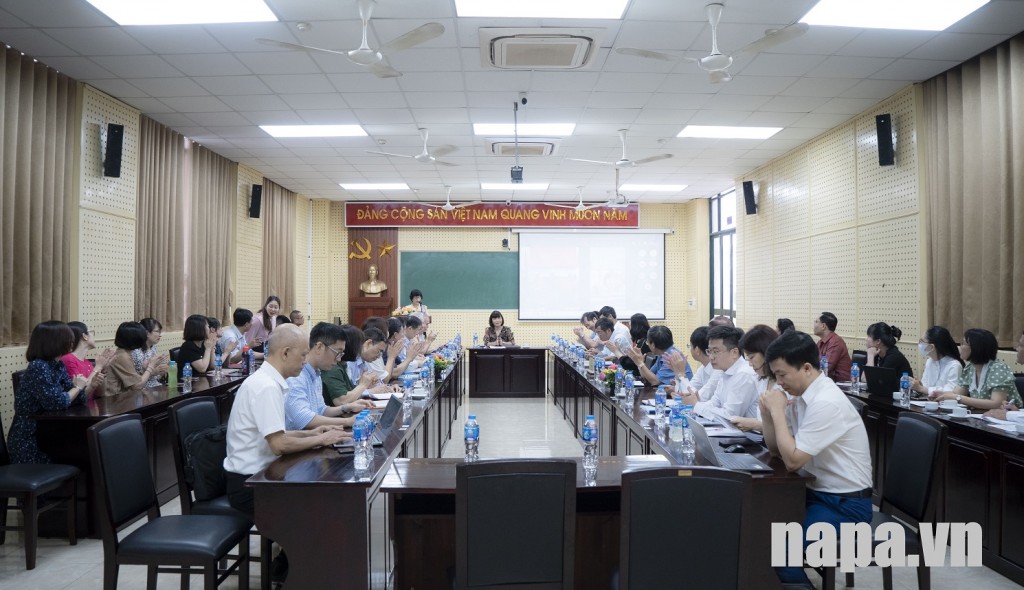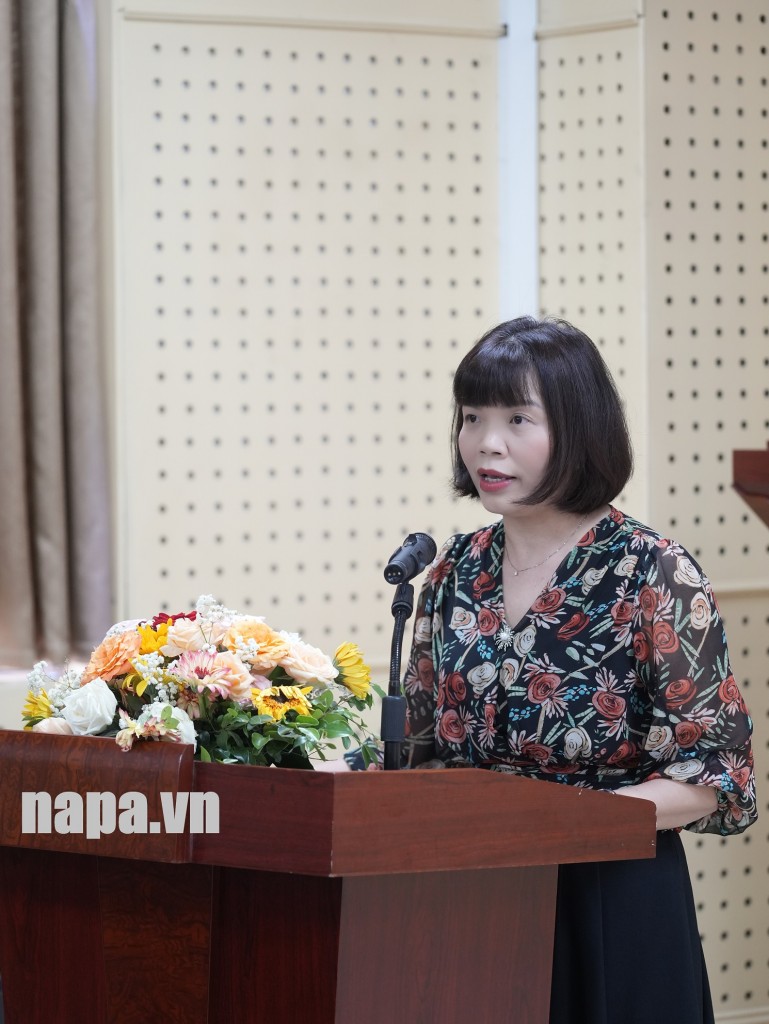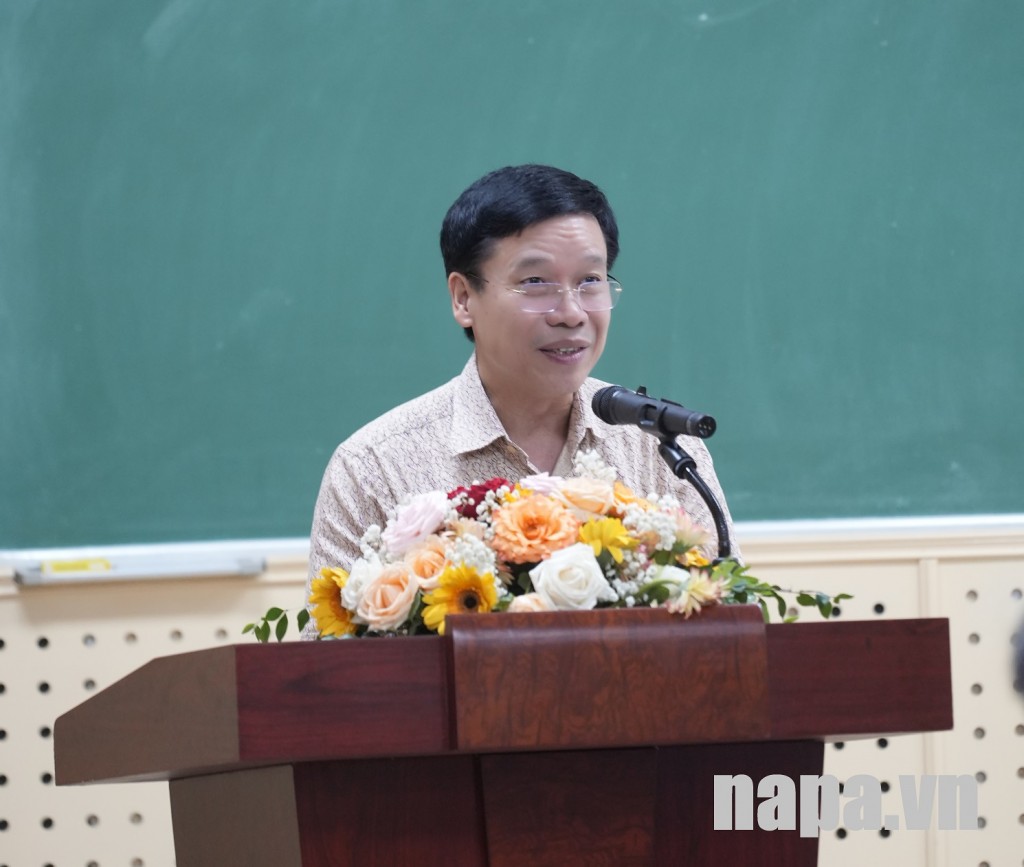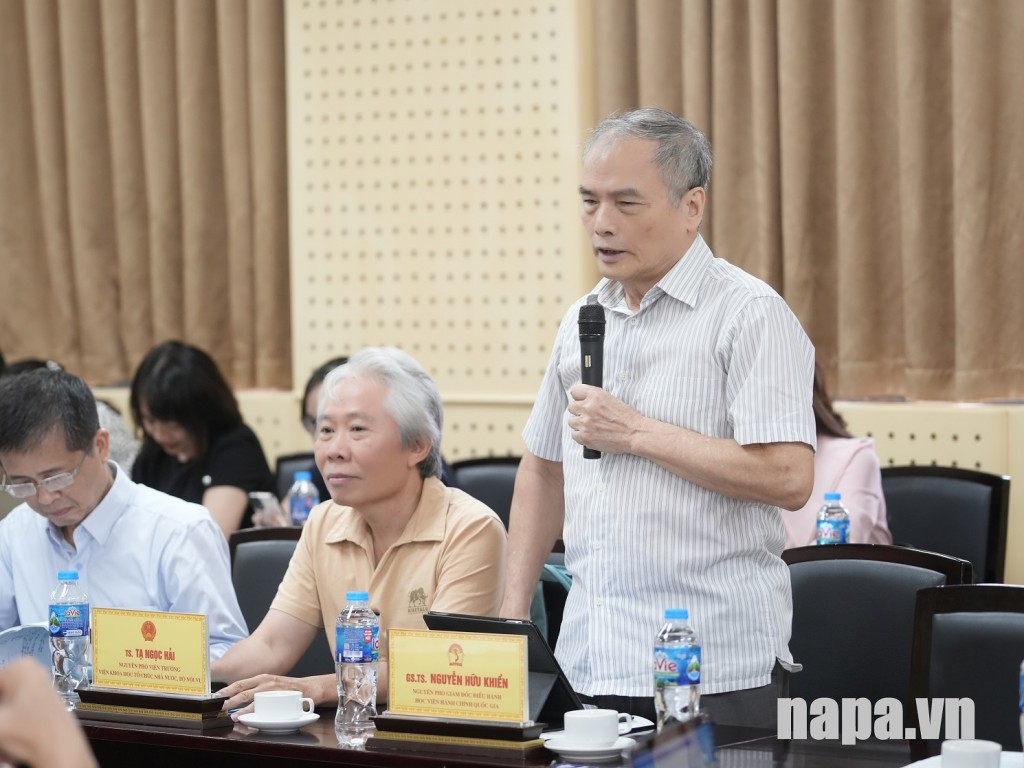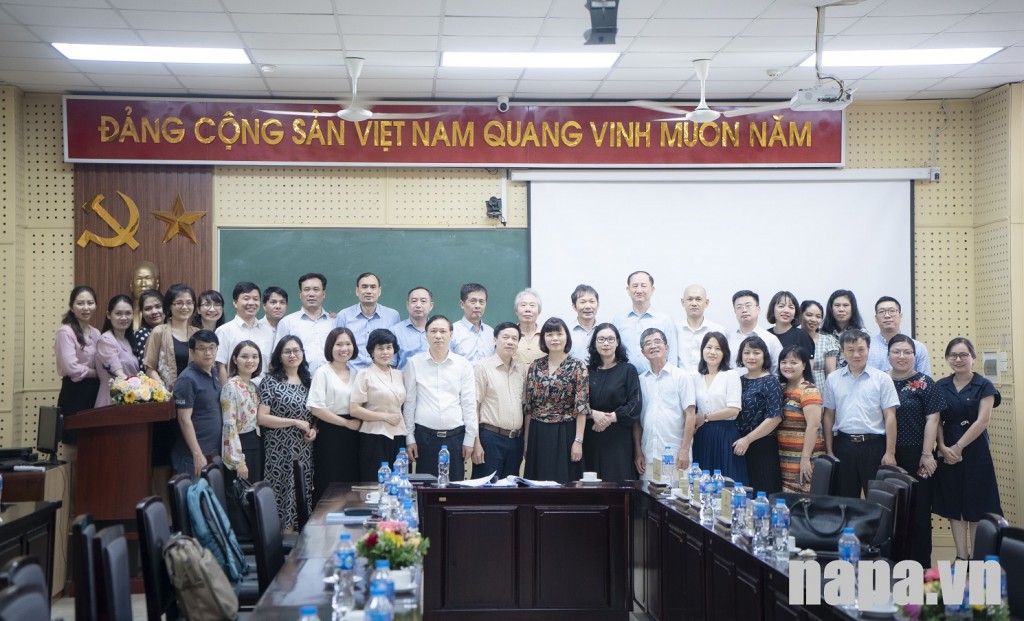On June 29, 2023, at NAPA Headquarters in Hanoi, the Faculty of Administrative Sciences held a workshop titled “Building a professional, responsible, dynamic and talented public service in Viet Nam – Theory and Practice”.
The workshop was presided over by Assoc.Prof.Dr. Nguyen Thi Hong Hai, Dean of the Faculty of Administrative Sciences.
Attending the workshop were Dr. Vu Hai Nam, General Director of the Department of Organization and Personnel, Ministry of Home Affairs (MoHA); Dr. Nguyen Ngoc Van, Director of the Institute for State Organizational Sciences, MoHA; Dr. Dinh Duy Hoa, former Director of the Department of Administrative Reforms, MoHA; Dr. Thai Quang Toan, former Director of the Department of Organization and Personnel, MoHA; Dr. Ta Ngoc Hai, former Deputy Director of the Institute for State Organizational Sciences, MoHA; Dr. Hoang Thi Ngan, former General Director of the Department of State Administrative Organization and Public Affairs, Government Office; Mr. Nguyen Phuoc Tho, former Deputy Director of the Department of Legal Affairs, Government Office.
On the side of NAPA, there were Dr. Lai Duc Vuong, NAPA Vice President; Prof. Dr. Nguyen Huu Khien, Former NAPA Executive Vice President; leaders of units under NAPA, as well as researchers, trainers, and students from the Faculty of Administrative Sciences.
The workshop was organized online for the NAPA branch campuses in Ho Chi Minh City, the Central region, and the Central Highlands.
In her opening remarks, Assoc.Prof.Dr. Nguyen Thi Hong Hai stated that the Vietnamese public service has steadily evolved in the direction of professionalism, responsibility, dynamism, and practicality over the years. There have been several Party and State documents addressing this matter. The National Assembly and the government have issued many important legal documents on the construction of the public service, including the Law on Cadres and Civil Servants in 2008, the Law on Public Employees in 2010, the Law amending and supplementing some articles of the Law on Cadres and Civil Servants in 2019, and many relevant decrees and circulars. These fundamental legal foundations for the public service are crucial for strengthening public service obligations, public service ethics, and state management effectiveness and efficiency.
The implementation of the above-mentioned documents in the past period has yielded several achieved results, including: refining the institutional structure, training, arrangement, and utilization of personnel, ensuring favourable working conditions and the implementation of regimes and policies for public servants; the contingent of cadres and civil employees having fulfilled their duties responsibly and effectively, taking full responsibility for the outcomes of their assigned duties and powers; maintaining a strong sense of organizational discipline; public servants proactively and closely coordinating in performing their duties.
In addition to the achieved results, the Vietnamese public service still has some limitations; for example, the existing system of regulations related to public service is not yet fully comprehensive; some cadres and civil servants still exhibit bureaucratic, bossy, and authoritarian attitudes, causing inconvenience for citizens; the timely and strict handling of disciplinary violations by certain public servants is still slow in some cases.
In this context, the workshop was held with the aim of creating a forum for experts, researchers, managers, and trainers to share, exchange, and discuss theoretical and practical issues related to the development of a professional, responsible, dynamic, and talented public service.
In order for the workshop to achieve the highest results, Assoc.Prof.Dr. Nguyen Thi Hong Hai hoped that all delegates focus on exchanging and discussing the following topics:
(1) Theoretical and practical issues related to a professional, responsible, dynamic, and talented public service:
+ Concepts and characteristics of a professional, responsible, dynamic, and talented public service;
+ Requirements and conditions for building a professional, responsible, dynamic, and talented public service;
+ Changes in the public service culture in the professional, responsible, dynamic, and talented public service;
+ The context, perspectives, and orientations for building a professional, responsible, dynamic, and talented public service in Viet Nam.
(2) The challenges and issues in establishing a professional, responsible, dynamic, and talented public service in Viet Nam:
+ Opportunities and challenges in establishing a professional, responsible, dynamic, and talented public service in Viet Nam;
+ The roles and responsibilities of the Government and governments at all levels in establishing a professional, responsible, dynamic, and talented public service in Viet Nam;
+ Solutions for establishing a professional, responsible, dynamic, and talented public service in Viet Nam.
(3) International experiences in developing a professional, responsible, dynamic, and talented public service and their implications for Viet Nam
(4) Other relevant topics related to the theme of the workshop.
During the workshop, Dr. Lai Duc Vuong, NAPA Vice President, highlighted that NAPA is in the process of restructuring its organizational structure and staff. The Party Committee, the Academy’s Board of Directors, and leaders of faculties, departments, and units are tasked with building a modern, talented, professional and dynamic public service. The aim is to establish NAPA as a stable and thriving research center in the field of public administration, worthy of being recognized as a special public non-business unit of the country. Furthermore, he emphasized that the opinions expressed at the workshop serve as a valuable source of documents, theories, and practical experiences, thereby contributing to the development of training programs and materials to meet the current situation and providing valuable knowledge and skills for the trainers in their curriculum development and training process.
In the workshop, Prof. Dr. Nguyen Huu Khien shared his insights on the topic “Towards a Professional Public Service”. He presented five key points related to the theme of his presentation, which are as follows:
(1) To establish a professional public service, there must be a team of professional public servants;
(2) The public service must reach a level of administrative culture excellence;
(3) A professional public service should incorporate friendly elements in the organization;
(4) National governance is a diverse and complex system, so professionalism must be consistent;
(5) A professional public service must have a practical and methodological training system.
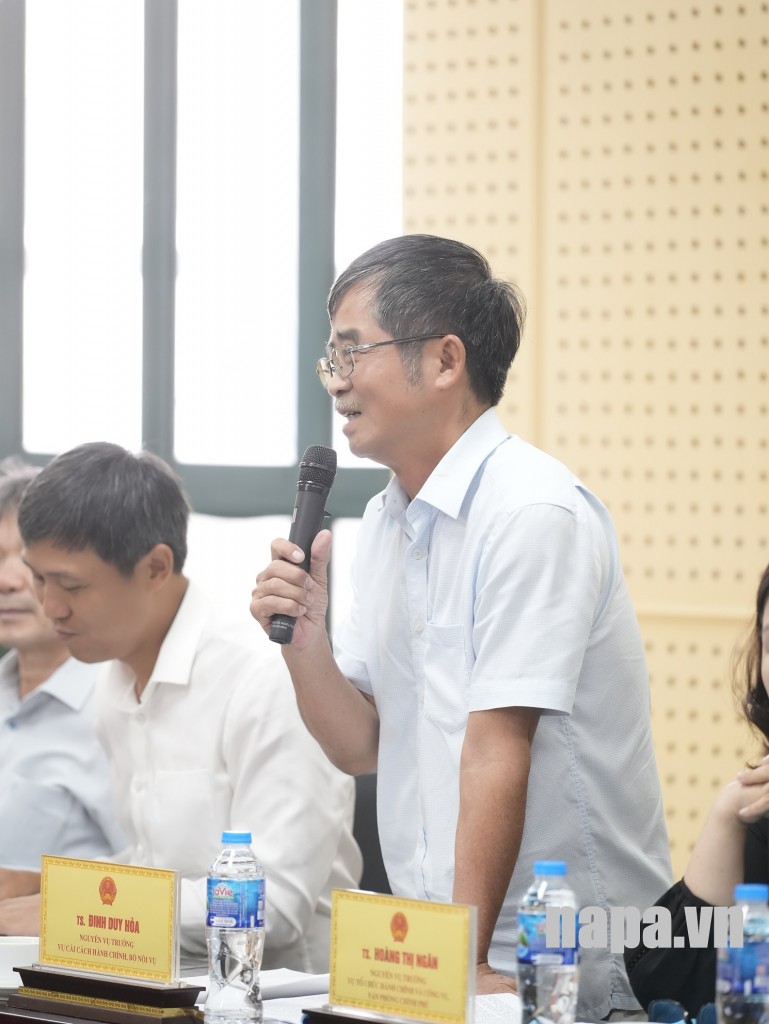
Dr. Dinh Duy Hoa, former Director of the Department of Administrative Reforms, MoHA, presenting at the workshop
At the workshop, with his presentation on “Some Issues on Building a Professional, Responsible, Dynamic, and Talented Public Service”, Dr. Dinh Duy Hoa addressed the concepts of professionalism, responsibility, dynamism, and talents of the public service. Based on these concepts, he drew the conclusion that to successfully establish a public service with positive values, it is necessary to supplement it with additional good values such as service-oriented, performance, and efficiency. He clarified the notion of public service and its five core values namely professionalism, responsibility, service-oriented, dynamism, efficiency, and effectiveness.
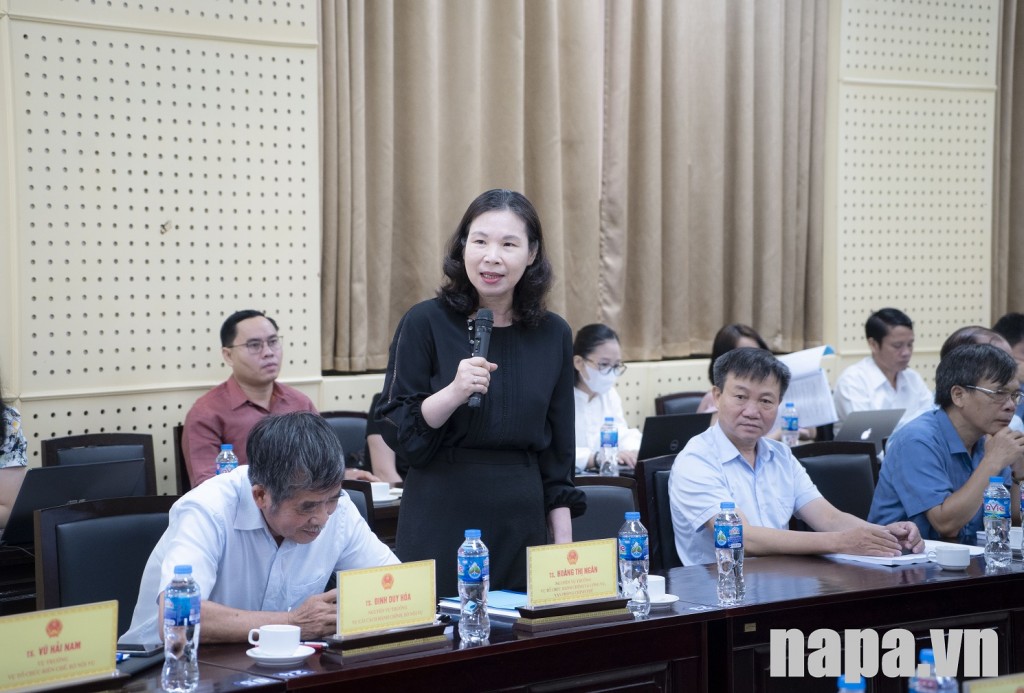
Dr. Hoang Thi Ngan, former General Director of the Department of State Administrative Organization and Public Affairs, Government Office, presenting at the workshop
Dr. Hoang Thi Ngan delivered a presentation focusing on building a rule of law administration, a transparent and accountable public service, and enhancing supervision mechanisms for the Government and local authorities; perfecting the law and organizing the implementation of the law on public service; perfecting the law on supervision and organizing the implementation of the law on people’s supervision. These are fundamental issues that must be addressed to construct a public service that is “immediate”, “normal”, professional, responsible, dynamic, and talented. To achieve this goal, it is vital to concentrate on human resources, the establishment of institutions, and the establishment of a legal framework that allows employees to work with confidence and without fear of making mistakes due to overlapping regulations. Furthermore, it is critical to have a law governing public service operations so that public servants understand “right and wrong” and have a handling process that is open, transparent, and systematic. Furthermore, Dr. Hoang Thi Ngan raised the question of whether the concept and implementation of “linked officials” have been reasonable and appropriate. She proposed the consideration of establishing a local public service to avoid the situation where local authorities “report” excessively to higher authorities without resolving their tasks effectively.
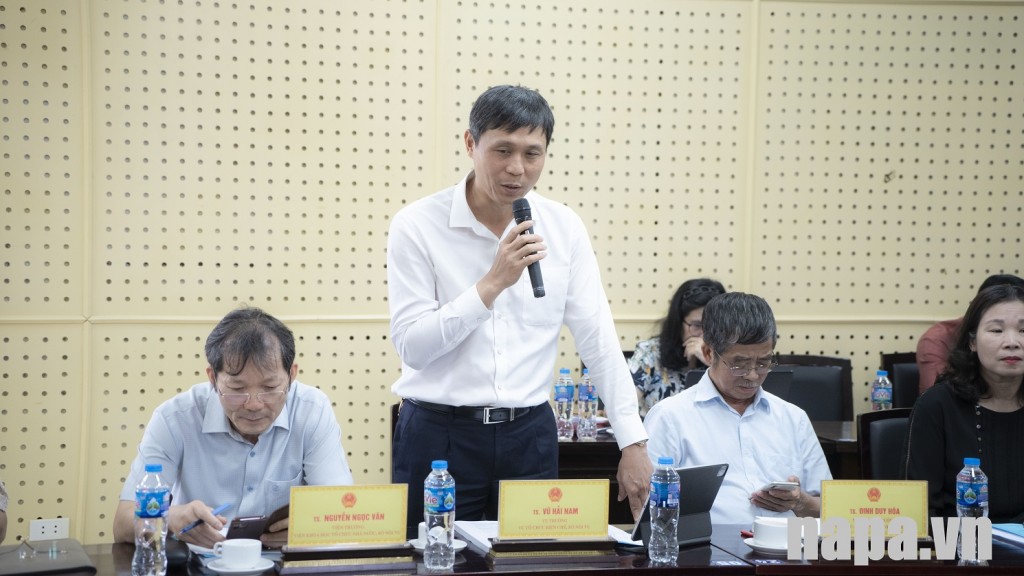
Dr. Vu Hai Nam, General Director of the Department of Organization and Personnel, Ministry of Home Affairs (MoHA), sharing his insights at the workshop
Dr. Vu Hai Nam voiced his thoughts on the issue of “The public service requires professionalism”. To accomplish this goal, the legal framework, methods, and procedures must be incorporated, and each individual must perform their obligations for the allocated task. Next, it is essential to enhance the independent and continuous monitoring mechanisms as well as establish a specific development plan for each program, strategy, or project (e.g. the issue of national digital transformation). Furthermore, in their position and role, cadres and public servants must finish their individual tasks at each given time and each allocated assignment to ensure professionalism while directly participating in or coordinating the execution of their duties.
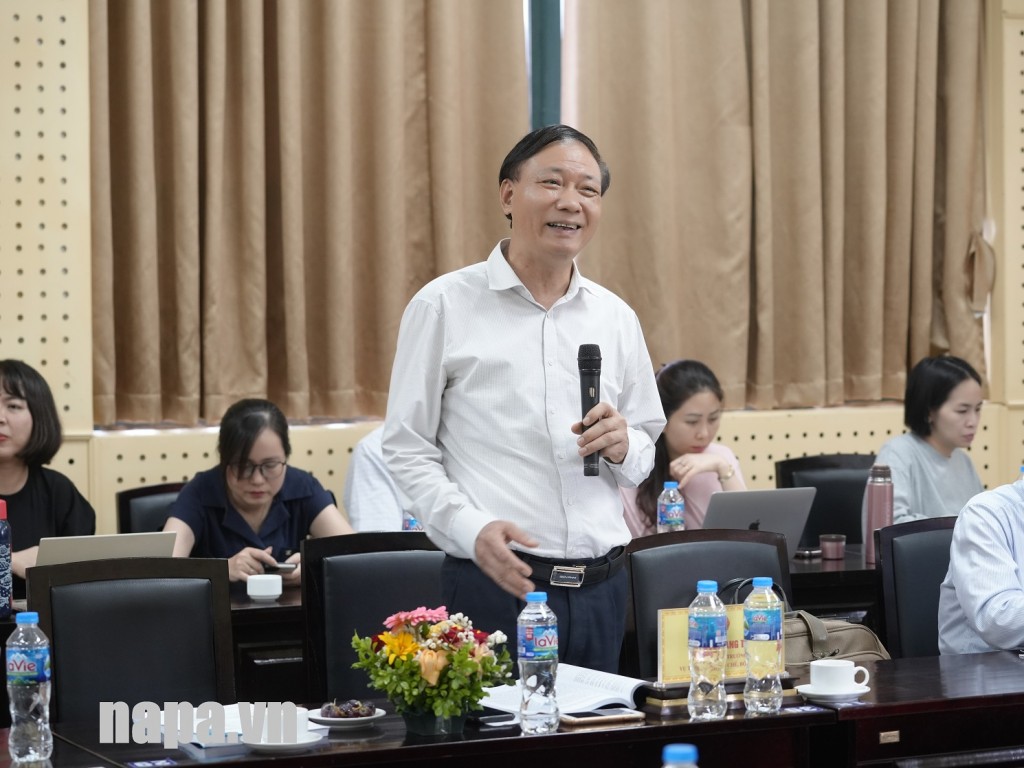
Dr. Thai Quang Toan, former Director of the Department of Organization and Personnel, MoHA, sharing his insights at the workshop
According to Dr. Thai Quang Toan, to build a professional, responsible, dynamic, and talented public service in Viet Nam, it requires high-quality human resources. He emphasized that public servant recruitment and quality assurance of candidates for public service positions must be highly invested to ensure effectiveness and efficiency. It is essential to promptly improve the process of building and identifying job positions within agencies and units, and to strengthen the organization and rearrangement of public servants based on job positions and competency frameworks, ensuring the appropriate people in the right positions to enhance the quality of task fulfilment. He also hoped that NAPA would take the lead in developing a bank of exam questions and organizing the implementation of the quality accreditation of public servants’ entrance examination (first round) so that ministries, branches, localities, agencies, and units could select candidates based on requirements and tasks (second round), thereby contributing to the development of a professional, responsible, dynamic, and talented public service.
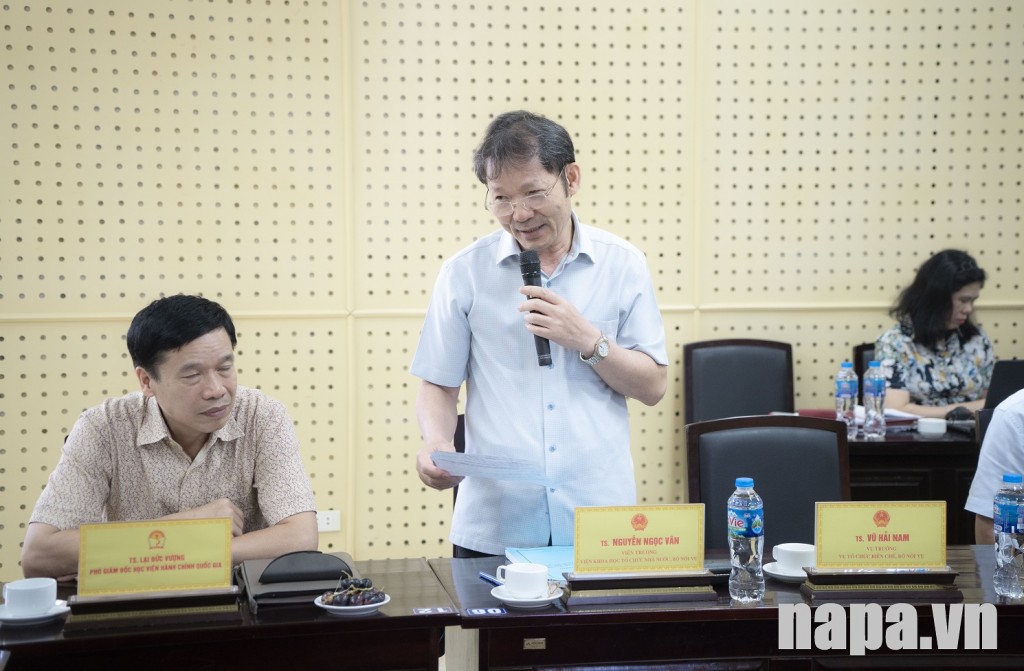
Dr. Nguyen Ngoc Van, Director of the Institute for State Organizational Sciences, MoHA, presenting at the workshop
Dr. Nguyen Ngoc Van proposed that the term “talented” should not be used in the public service context. Instead, it is sufficient to use terms like “professional” and “modern” with the addition of the content of national governance to develop an effective and efficient public service. The requirement of national governance is, in essence, the consensus among the governing entities. Furthermore, the cadres and public servants should be aware of their obligations and tasks to fulfill the assigned tasks as well as be conscious of building a modern and effective public administration system.
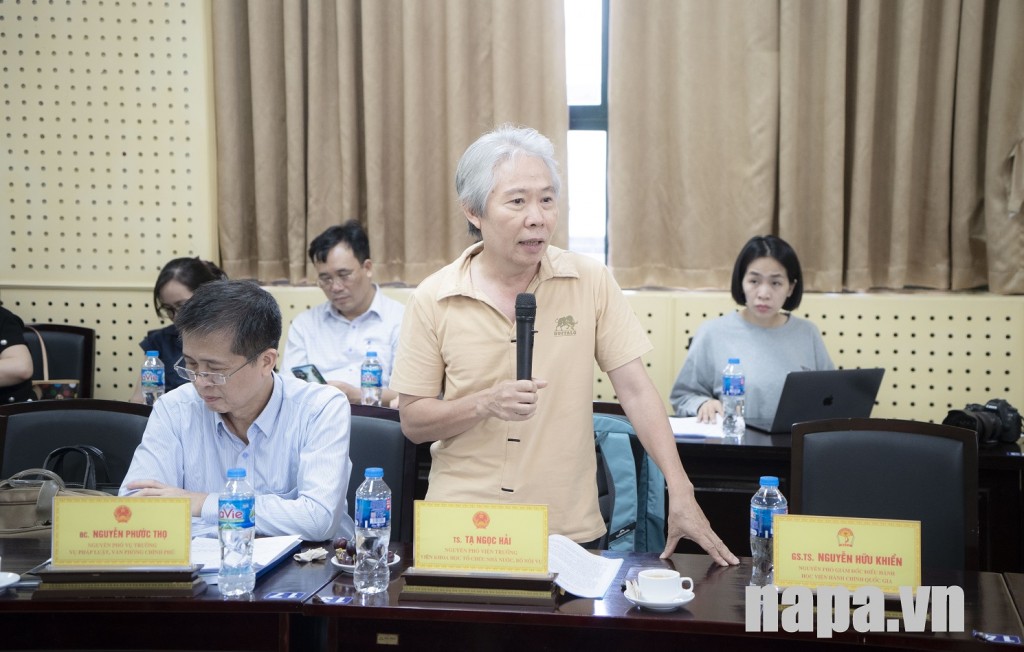
Dr. Ta Ngoc Hai, former Deputy Director of the Institute for State Organizational Sciences, MoHA, presenting at the workshop
Dr. Ta Ngoc Hai emphasized the criteria for identifying talented young public servants in the talented public service, including age, gender, and ethnicity; their beliefs and aspirations to contribute to the development of the community and society; outstanding personal abilities; work performance results; and the level of accumulated knowledge, skills, and experience for capacity development. Along with the specified requirements and standards, young and talented public servants are those who satisfy the five categories of criteria described above. This serves as the foundation for the concrete implementation of policy institutions for the ministry in the practical public service.
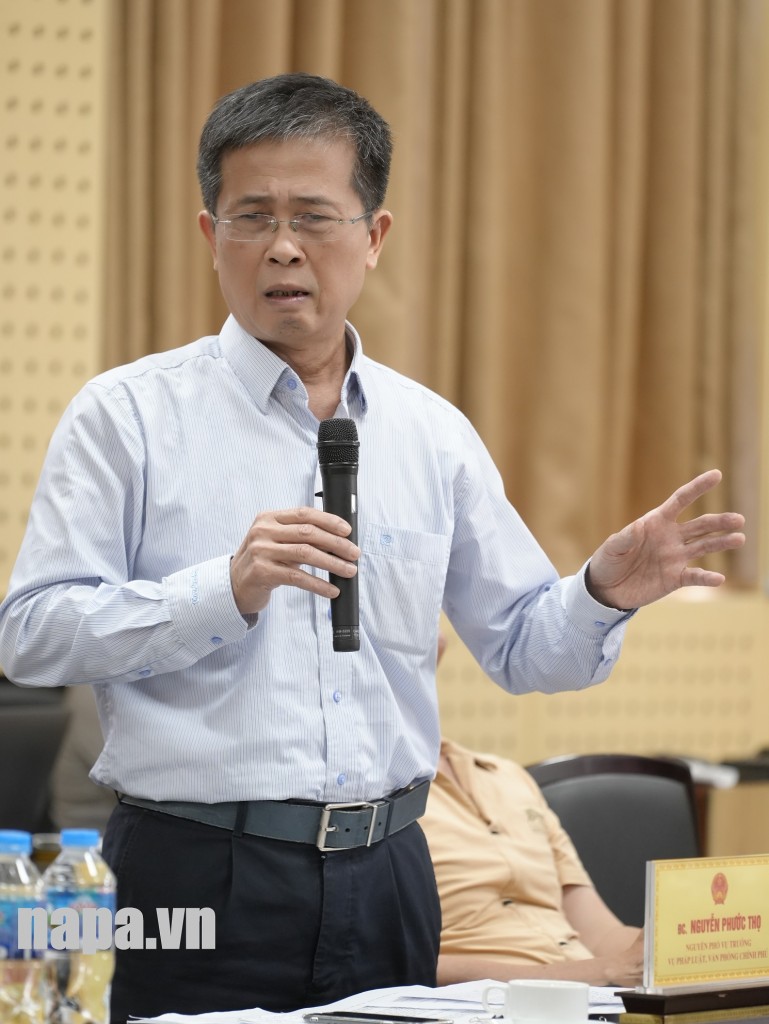
Mr. Nguyen Phuoc Tho, former Deputy Director of the Department of Legal Affairs, Government Office, speaking at the workshop

Dr. Le Van Hoa, Head of Division of Policy Science, Faculty of Administrative Sciences, speaking at the workshop
In addition to nearly 40 papers published in the conference proceedings, the delegates also contributed their opinions to the workshop’s topic, such as essential requirements to build a team of cadres; the current state of responsible, professional, dynamic, and talented public servants in Viet Nam; reforming public servant recruitment to build a professional, responsible, dynamic, and talented public service in Viet Nam; developing digital skills for public servants towards a professional, responsible, dynamic, and talented public service in Viet Nam; and the need for a professional and modern public service that attracts the best talent from society, distinguishing and separating different public service activities and positions.
Assoc. Prof. Dr. Nguyen Thi Hong Hai concluded the workshop by thanking the participants, experts, and researchers both within and outside the Academy for their opinions and papers. Such valuable knowledge and experiences will serve as valuable references to be applied in the advisory work for formulating policies on establishing a professional and modern public service in the new context of Viet Nam, as well as in the training activities at NAPA.


